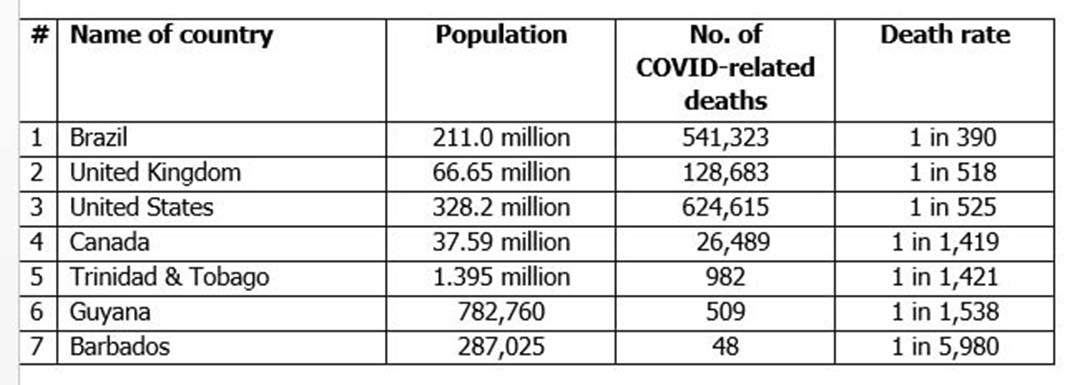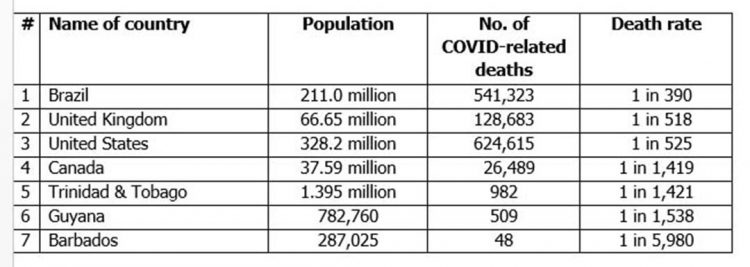Last week, we reported that former South African President Jacob Zuma turned himself over to the authorities after he was sentenced to 15 months’ imprisonment for his failure to appear before the country’s anti-corruption commission to answer charges of corruption while holding office. Supporters of the former President took to the streets across the country, burning trucks, commercial property, and blocking major roads in KwaZulu-Natal province. Looting was also widespread. Near Pietermaritzburg, about 20 trucks were stopped and set on fire, and a truck ferrying new luxury vehicles was seen burning along a major road. Another truck from the United Nations World Food Program was also set alight after protesters took bags of maize meal from the vehicle. Crowds clashed with police and ransacked or set ablaze several shopping malls. At least 212 people have died in the unrest.
 According to the National Aeronautics and Space Administration (NASA), the world is expected to see increased coastal flooding starting in the mid-2030s due to a “wobble” in the moon’s orbit. The numbers of floods could quadruple because of the combined effects of the moon’s gravitational pull which is the main cause of high and low tides, and rising sea levels due to global warming and climate change. The wobble in the moon’s orbit takes 18.6 years to complete. The United Nations has stated that by 2050 coastal cities will see hundreds of millions of people at risk from floods made worse by rising seas.
According to the National Aeronautics and Space Administration (NASA), the world is expected to see increased coastal flooding starting in the mid-2030s due to a “wobble” in the moon’s orbit. The numbers of floods could quadruple because of the combined effects of the moon’s gravitational pull which is the main cause of high and low tides, and rising sea levels due to global warming and climate change. The wobble in the moon’s orbit takes 18.6 years to complete. The United Nations has stated that by 2050 coastal cities will see hundreds of millions of people at risk from floods made worse by rising seas.
Considering that most of Guyana’s coast is below sea level at high tide, instead of devoting all our energies towards the oil and gas industry (which is the main cause of global warming and climate change), it is extremely important for the authorities to take note of NASA’s findings and plan accordingly. The relocation of the country’s capital, Georgetown, should be given utmost priority while those living areas in low-lying areas on the coast should also be encouraged to move to higher ground and provided with incentives to do so.
In the United States, the partial collapse of the condominium in Miami on 24 June 2021 has so far resulted in 94 deaths, with 22 persons still to be accounted for as of last Monday. Residents in the neighbouring complexes are increasing worried that their buildings are at risk, as engineering inspections revealed cracks, water penetration, spalling (flaking of concrete) and corrosion. These were some of the problems identified at the condominium just before its collapse. It is unclear whether sea level rise due to global warming and climate have contributed to this disaster.
In today’s article, we discuss the some of the latest developments in relation to the COVID-19 pandemic.
Sputnik V vaccine
Reuters reported that the developers of Russia’s Sputnik V coronavirus vaccine have repeatedly failed to provide data to the European Medicines Agency (EMA) – the European Union’s medicines watchdog – in relation to the vaccine’s safety and efficacy to facilitate the drug approval process. An earlier assessment by a French delegation of scientists found that the vaccine developers were unable to document that the master cell bank, the initial building block of the vaccine, complied with specific EU regulations on preventing disease contamination. As of June 2021, the EMA had received hardly any manufacturing data, and the clinical data the agency had received was incomplete. These include case report forms that record any adverse effects people experienced after receiving the jab in trials. More than 60 countries, including Guyana, have approved of the use of Sputnik V although the World Health Organisation is yet to approve of its use.
Vaccination and COVID-related deaths
The total number of COVID-19 cases worldwide is 190.610 million while COVID-related deaths amounted to 4.096 million. An estimated 173.690 million have recovered from the virus. A little over a quarter of the global population has received at least one dose of a vaccine while only one percent of persons in low-income countries received a dose. Research has shown that a single shot reduces the likelihood of contracting the virus by only 30 percent or less.
Here are the latest statistics about COVID-related deaths rates in selected countries (in order from the most serious):
In early June 2020, Brazil began averaging about 1,000 deaths per day from COVID-19, joining the United States, and later India, as the countries with the world’s largest death tolls. However, by August, the spread of the virus eased, and daily death rates began to drop. Shopping malls, restaurants and beaches started to draw crowds again, and tourist attractions reopened in several cities. In late November, however, the number of cases began to rise again, with daily death rates surpassing 1,000 in major cities. Hospitals were overwhelmed with patients. The response by the authorities has so far been fragmented and decentralized with a disregard for science, including the wearing of masks and social distancing. Experts are warning of a third wave of the virus.
The UK’s economy is set to reopen today with 87.8 percent of adults having received the first dose of a COVID-19 vaccine. The government has indicated that it was trying to ensure that two-thirds of adults receive their second dose by today. The reopening comes at a time when there is a fresh surge of COVID infection especially from the Delta variant. The Wall Street Journal reported that almost half of UK’s recent COVID-related deaths were from people who have been vaccinated. According to the BBC, nearly two-thirds of people infected with the Delta variant have not had a vaccine at all. More than half of these have since died.
A recent report from Public Health England stated that more vaccinated people in the UK are dying of COVID than unvaccinated people. Of the 257 people who tested positive from the Delta variant during the period 1 February to 21 June 2021, 163 or 63.4 percent died within 28 days although they had received at least one dose of the vaccine. The Delta variant, which was first identified in India, has accounted for 90 percent of recent COVID-19 infections. It has spread to more than 85 countries, including the United States where it is the most common variant. According to a former director of the World Health Organization, the Delta variant is as a result of a double mutation in the virus – one mutation increases the transmissibility while the second increases the probability of escaping or avoiding the efficacy of the vaccine.
Delta is also wreaking havoc in Spain, Portugal and other European countries. Spain alone reported nearly 44,000 cases last Tuesday, necessitating the reinstatement of curfews. By next month, the strain is expected to affect 70-90 percent in the EU countries where 44 percent of the population have been fully vaccinated.
In Canada, 48.6 percent of the population have been fully vaccinated, compared with 48.4 percent in the United States. Based on these percentages, a total of 16,612,850 Canadians and 160,686,378 Americans are now fully vaccinated. Some 78 percent of people aged 12 years and older have received at least one dose of a COVID-19 vaccine while 44 percent of persons 12 years and older are fully vaccinated. Canada has also surpassed the United States in the percentage of people who have received at least one dose of a COVID-19 vaccine, at 69.4 percent, compared with 55.9 percent in the United States.
Fully vaccinated U.S. citizens and permanent residents may be allowed to visit Canada for non-essential purposes from mid-August, with the possibility of a wider opening to other countries by early September. Canadian citizens and permanent residents returning to Canada by air from Guyana are required to be tested at the airport although they are fully vaccinated and are in possession of negative PCR results based on tests carried out within the last 72 hours of their final direct flight to Canada. This is because Guyana is one of the countries categorized as a high risk country. There are four categories of risk: Level 4 – very high; Level 3 – high; Level 2 – moderate; and Level 1 – low.
Closer home, Trinidad & Tobago Prime Minister Dr. Keith Rowley is considering making COVID-19 vaccines mandatory. He stated that if the variant becomes more virulent, then the Government would have to do what is necessary to protect the population. Since 22 March 2021, the country had closed its international borders to all travellers, including its nationals, and had suspended all commercial flights. Last Saturday, the borders were reopened with the arrival of the first flight from Guyana. Fully vaccinated citizens and visitors no longer have to stay in quarantine, and there are testing facilities at the airport.
Here in Guyana, the Minister of Health Dr. Frank Anthony has stated that, with daily flights to Guyana from the United States, there is a high possibility that COVID-19 variants are already in the country. He, however, argued that even if there is confirmation that this is so, it is not a priority, as preventative measures such as wearing masks and social distancing will remain in place. The Minister further stated that as of last Thursday, 241,680 persons have received a first dose of a COVID-19 vaccine, representing 49.6 percent of the adult population, while 126,620 persons have received both doses, accounting for 26% of the adult population. Additionally, over 67 percent of persons 60 years and over have been fully vaccinated, while only 43 percent of adults between the ages of 18 and 30 have received both doses of a COVID-19 vaccine.
Conclusion
As stated above, Guyana remains a high risk country for COVID-19 infections. With so many countries now affected by the Delta variant which has more devastating effects, it is important for additional measures to be put in place to protect the population. The daily flights to and from Guyana and the United States are a source of concern. Perhaps, testing facilities should be placed at the two international airports to enable the screening of passengers before entry into the country, notwithstanding that they may have been fully vaccinated and are in possession of negative test results.
The situation in Brazil is a most distressing one in that, given the looseness of our borders, the COVID-19 virus and all its variants can easily migrate into country, if this has not happened already. Perhaps, some restrictions could be placed on travels to and from the interior locations.







